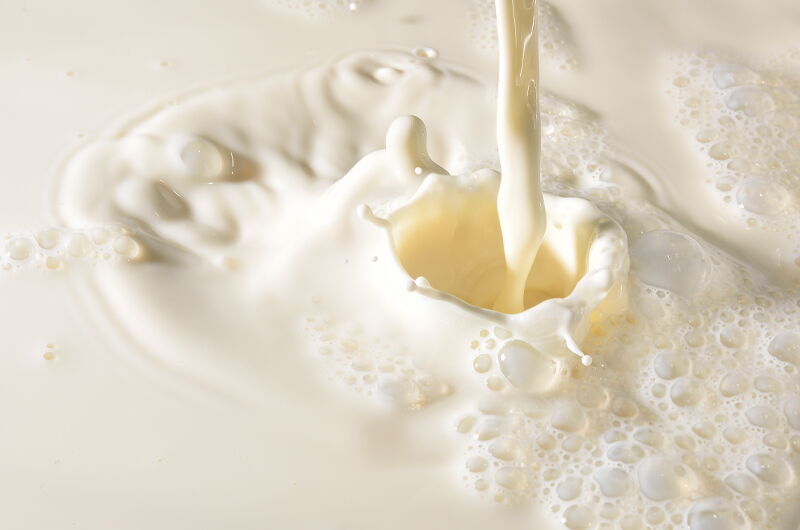Milk yes or milk no? There are strong controversies in general as to whether the consumption of cow's milk is beneficial or not for humans.
In recent years, also under the pressure of increasingly growing vegan fashions and choices or on the basis of food restrictions of any kind, dairy products (milk derivatives) have been accused and indicated as causes of the most disparate diseases or problems (including pathologies severe such as cancer and neurodegenerative diseases).
In this article we will first go to a general overview of milk, its Nutrition information and its composition, and then understand if it is appropriate to eliminate it from our diet or, rather, keep it.
Milk and dairy products
Milk is a highly nutritious liquid that forms in the mammary glands of mammals to support their babies during the first few months of life. In this specific case we are going to treat cow's milk, cow's milk. A huge variety of food products are made from cow's milk: cheese, cream, butter and yogurt.

These foods are referred to as dairy or dairy products and are an important part of the modern diet.
Milk Protein
Milk is a rich source of protein: it provides about 1 gram of this nutrient in every 30ml.
Milk Protein can be divided into two groups based on their solubility in water:
- insoluble milk Protein are called casein;
- soluble milk Protein are known as whey Protein.
Both groups of milk proteins are considered to be of excellent quality, with a high proportion of essential amino acids and good digestibility.

Casein
Casein makes up the majority, or 80%, of milk Protein. It is indeed a family of different Protein, with alpha-casein being the most abundant. An important property of casein is its ability to increase the absorption of minerals, such as calcium and phosphorus and to lower blood pressure [1] [2] [3].
Whey protein
Whey is another family of Protein, accounting for 20% of the protein content of milk.
It is particularly rich in branched-chain amino acids (BCAAs), such as leucine, isoleucine and valine.
Whey protein has been associated with many beneficial health effects , such as lowering blood pressure and improving mood during times of stress. They are also excellent for muscle growth and maintenance , due to their complete amino acid pool they are used in sports as a dietary supplement.
Milk fats
Fresh whole milk contains about 4% fat.
In many countries, the marketing of milk is mainly based on fat content. In the United States, for example, whole milk contains 3.25% fat, skimmed milk 2% and low-fat milk 1%. Milk fat is one of the most complex of all natural fats, containing around 400 different types of fatty acids.
- whole milk is very rich in saturated fats, which make up about 70% of its fatty acid content;
- polyunsaturated fats are present in minimal quantities, making up about 2.3% of the total fat content;
- monounsaturated fats make up the rest, about 28% of the total fat content;
- in addition, trans fats are found naturally in dairy products.
Unlike the trans fats in processed foods, trans fats from dairy products, also called trans fats from ruminants, are considered health benefits.
Milk contains small amounts of trans fats, such as vaccenic acid and conjugated linoleic acid (CLA) to which we have dedicated another article.
Milk carbohydrates
The carbohydrates in milk are mainly in the form of simple lactose sugar, which makes up about 5% of milk.
Some people don't have the enzyme needed to break down lactose. This condition is called lactose intolerance, this is one of the cases where, of course, milk and dairy products should not be included in the meal plan.
Micronutrients
Milk contains all the vitamins and minerals necessary to support the growth and development of a young calf during its first months of life. It also provides nearly every single nutrient that humans need, making it one of the most nutritious foods available.
The following vitamins and minerals are found in particularly high quantities in milk:
- Vitamin B12 . Foods of animal origin are the only rich sources of this essential vitamin. Milk is very rich in vitamin B12.
- Calcium . Milk is not only one of the best dietary sources of calcium, but the calcium in milk is also easily absorbed.
- Riboflavin . Dairy products are the main source of riboflavin, also known as vitamin B2, in the Western diet.
- Phosphorus . Dairy products are a good source of phosphorus, a mineral that plays an essential role in many biological processes.

Vitamins are added to many marketed milk varieties, such as vitamin D in most cases.
Conclusions
There are several arguments why the use of milk may be discouraged. There are relatively few human cultures that use milk in adulthood. In fact, in various fields, unrelated to modern globalization processes, milk is considered a food to be consumed only at an early age.
It is therefore no coincidence that the adult man is not perfectly equipped (if we want to say so) to better digest this food. We talked about lactose before, here is normally lactase, the enzyme intended for the absorption and metabolization of lactose, is produced only in the first years of life. Our body adapts to producing it when we continue to consume milk regularly. However, when we stop consuming it, this enzyme is no longer produced and we become intolerant to lactose, i.e. we cannot digest it, it ends up in the intestine and, being osmotically active, recalls water causing problems with intestinal evacuation.
There are also problems regarding allergy to milk Protein, very common as it contains many allergens.
The main problem, however, concerns an alleged pro-inflammatory effect of milk which would seem to actually lead to a degeneration of clinical states of diabetes melito, tumors and metabolic pathologies. These Protein would stimulate a situation of subclinical inflammation capable of worsening oxidative stress and amplifying the pathological response of the organism. There are still no clarifications in the literature but epidemiological observations would seem to suggest such conclusions.
Per these reasons, the consumption of milk, without alarmism, should be moderate. Our suggestion is to make it regular, to avoid the loss of its metabolization and digestion capacity, but to prefer small quantities of dairy products, preferably seasoned, which have a more gentle impact on the gastrointestinal system. So let's limit them to special occasions and don't abuse this source!
References:
[1] https://pubmed.ncbi.nlm.nih.gov/23958008/
[2] https://pubmed.ncbi.nlm.nih.gov/20373185/
[3] https://www.ncbi.nlm.nih.gov/pmc/articles/PMC4303860/
